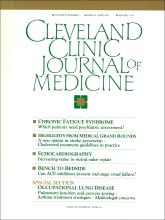ABSTRACT
Antilymphocyte preparations are effective immunosuppressive agents for treatment of post-transplant rejection in renal transplantation. Polyclonal preparations have been used for more than 15 years, and more recently monoclonal antibodies have been employed. These agents prevent rejection when used prophylactically soon after renal transplantation and they effectively treat acute rejection episodes either as first-line therapy or for steroid-refractory rejection episodes. In the past, polyclonal antilymphocyte preparations were poorly reproducible, contained contaminating antibodies against normal blood cell constituents, and required administration of large doses through a central vein or an arteriovenous fistula. The monoclonal antibody preparation Orthoclone OK T3 has proven as effective as the polyclonal preparation ALG to prevent or treat acute rejection episodes in the early post-transplant period. Compared to polyclonal preparations, monoclonal preparations are preferable because of their uniformity, absence of contaminating antibodies, and ease of administration. The development of antibodies to mouse proteins in the recipient may limit the usefulness of monoclonal preparations when given for an extended period or in repeated courses.
- Copyright © 1991 The Cleveland Clinic Foundation. All Rights Reserved.






